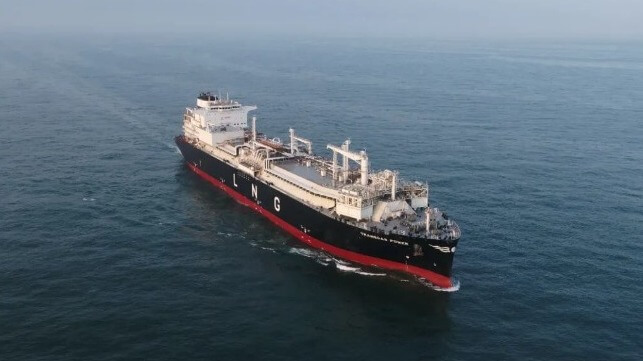FSRUs May Help Fix Europe's Dependence on Russian Gas

Floating storage and regasification units (FSRUs) may soon contribute to Europe's efforts to replace Russian natural gas with new sources from overseas.
Northern Europe is heavily dependent on state-owned gas company Gazprom, and with the Kremlin's decision to invade Ukraine, this dependence has become a serious economic liability. Russia sends about 155 billion cubic meters (bcm) of gas to Europe every year, and it is impossible to replace this much volume overnight. Gas from overseas has to be liquefied and shipped in by LNG carrier, and the market for LNG is already tight. The volumes that are available must fit through a limited number of receiving terminals, where LNG is stored and regasified for utility distribution.
The EU has about 240 bcm of regasification capacity, but a large fraction of the unused terminal space is concentrated in Spain, and it is poorly connected with the rest of Europe. In Germany, which gets more than half of its gas supply from Russia, there are no regasification terminals. New terminals take years to build, so adding capacity with a greenfield development is not an option in the immediate term.
FSRUs, however, may play a role as early as this fall. These modified LNG carriers can act as a moored "terminal" to store and regasify the cargo of other LNG carriers. A typical FSRU has about 4 bcm of regasification capacity, enough to replace 2.5 percent of Europe's Russian gas imports (if adequate shipments of LNG can be sourced to keep the terminal busy).
Last week, Dutch utility Gasunie announced an agreement with LNG shipowner Exmar to charter an FSRU for the port of Eemshaven.The vessel has been fixed on a five-year charter, and it should be in operation by the end of the third quarter, the utility said. Together with an expansion of Gasunie's existing LNG terminal in Rotterdam, the 4-bcm FSRU will help double the Netherlands' LNG import capacity.

that matters most
Get the latest maritime news delivered to your inbox daily.
More may be coming. In a recent earnings call, Dynagas CEO Tony Lauritzen said that he is seeing "more interest in the FSRU space, and in particular, around the European continent." His firm has two FSRUs that are currently on charter as LNG carriers, and while they are not available this year, there may be other opportunities.
"When it comes to converting some of the [LNG carrier] units that we have coming off-charter in the future, that is definitely something we could look at. For example, for some of the designs, we have the [FSRU] conversion drawings ready so that is probably something that is more realistic," Lauritzen said.
